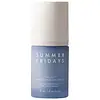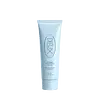What's inside
What's inside
 Key Ingredients
Key Ingredients

 Benefits
Benefits

 Concerns
Concerns

 Ingredients Side-by-side
Ingredients Side-by-side

Water
Skin ConditioningPropanediol
SolventSqualane
EmollientGlycerin
HumectantCetyl Ethylhexanoate
EmollientAloe Barbadensis Leaf Juice
Skin ConditioningAmmonium Acryloyldimethyltaurate/Vp Copolymer
Polyester-5
Sodium Hyaluronate
HumectantAvena Sativa Kernel Flour
AbrasiveSodium PCA
HumectantPanthenol
Skin ConditioningCeramide NP
Skin ConditioningArnica Montana Flower Extract
MaskingLaminaria Digitata Extract
Skin ProtectingCentella Asiatica Extract
CleansingPalmitoyl Tripeptide-38
Skin ConditioningNiacinamide
SmoothingAcetyl Glucosamine
Skin ConditioningArginine
MaskingAspartic Acid
MaskingPCA
HumectantGlycine
BufferingAlanine
MaskingSerine
MaskingValine
MaskingProline
Skin ConditioningThreonine
Isoleucine
Skin ConditioningPhenylalanine
MaskingHistidine
HumectantSodium Lactate
BufferingCaprylhydroxamic Acid
Glyceryl Stearate
EmollientDisodium EDTA
Sodium Hydroxide
BufferingPolyglyceryl-3 Methylglucose Distearate
EmulsifyingSodium Benzoate
MaskingCitric Acid
BufferingHydroxypropyl Cyclodextrin
MaskingXanthan Gum
EmulsifyingPotassium Sorbate
Preservative1,2-Hexanediol
Skin ConditioningPropylene Glycol
HumectantWater, Propanediol, Squalane, Glycerin, Cetyl Ethylhexanoate, Aloe Barbadensis Leaf Juice, Ammonium Acryloyldimethyltaurate/Vp Copolymer, Polyester-5, Sodium Hyaluronate, Avena Sativa Kernel Flour, Sodium PCA, Panthenol, Ceramide NP, Arnica Montana Flower Extract, Laminaria Digitata Extract, Centella Asiatica Extract, Palmitoyl Tripeptide-38, Niacinamide, Acetyl Glucosamine, Arginine, Aspartic Acid, PCA, Glycine, Alanine, Serine, Valine, Proline, Threonine, Isoleucine, Phenylalanine, Histidine, Sodium Lactate, Caprylhydroxamic Acid, Glyceryl Stearate, Disodium EDTA, Sodium Hydroxide, Polyglyceryl-3 Methylglucose Distearate, Sodium Benzoate, Citric Acid, Hydroxypropyl Cyclodextrin, Xanthan Gum, Potassium Sorbate, 1,2-Hexanediol, Propylene Glycol
Water
Skin ConditioningGlycerin
HumectantDimethicone
EmollientDimethicone Crosspolymer
Emulsion StabilisingC12-15 Alkyl Benzoate
AntimicrobialHydroxyethyl Acrylate/Sodium Acryloyldimethyl Taurate Copolymer
Emulsion StabilisingImperata Cylindrica Root Extract
Skin ConditioningCaprylic/Capric Triglyceride
MaskingMethylpropanediol
SolventSqualane
EmollientCetyl Alcohol
EmollientMeadowfoam Estolide
Skin ConditioningDipalmitoyl Hydroxyproline
Skin ConditioningTribehenin
EmollientSodium PCA
HumectantUrea
BufferingCarbomer
Emulsion StabilisingPhenoxyethanol
PreservativeCaprylyl Glycol
EmollientCollagen Amino Acids
MoisturisingPropanediol
SolventHaematococcus Pluvialis Extract
AntioxidantTrehalose
HumectantLinoleic Acid
CleansingPhytosterols
Skin ConditioningPhospholipids
Skin ConditioningPalmitic Acid
EmollientPolysorbate 60
EmulsifyingSorbitan Isostearate
EmulsifyingCeramide Ng
Skin ConditioningHexylene Glycol
EmulsifyingPEG-10 Phytosterol
EmulsifyingPolyquaternium-51
Skin ConditioningTriacetin
AntimicrobialSodium Hyaluronate
HumectantAcrylates/C10-30 Alkyl Acrylate Crosspolymer
Emulsion StabilisingPalmitoyl Hexapeptide-12
Skin ConditioningSodium Hydroxide
BufferingLactic Acid
BufferingWater, Glycerin, Dimethicone, Dimethicone Crosspolymer, C12-15 Alkyl Benzoate, Hydroxyethyl Acrylate/Sodium Acryloyldimethyl Taurate Copolymer, Imperata Cylindrica Root Extract, Caprylic/Capric Triglyceride, Methylpropanediol, Squalane, Cetyl Alcohol, Meadowfoam Estolide, Dipalmitoyl Hydroxyproline, Tribehenin, Sodium PCA, Urea, Carbomer, Phenoxyethanol, Caprylyl Glycol, Collagen Amino Acids, Propanediol, Haematococcus Pluvialis Extract, Trehalose, Linoleic Acid, Phytosterols, Phospholipids, Palmitic Acid, Polysorbate 60, Sorbitan Isostearate, Ceramide Ng, Hexylene Glycol, PEG-10 Phytosterol, Polyquaternium-51, Triacetin, Sodium Hyaluronate, Acrylates/C10-30 Alkyl Acrylate Crosspolymer, Palmitoyl Hexapeptide-12, Sodium Hydroxide, Lactic Acid
 Reviews
Reviews

Ingredients Explained
These ingredients are found in both products.
Ingredients higher up in an ingredient list are typically present in a larger amount.
Glycerin is already naturally found in your skin. It helps moisturize and protect your skin.
A study from 2016 found glycerin to be more effective as a humectant than AHAs and hyaluronic acid.
As a humectant, it helps the skin stay hydrated by pulling moisture to your skin. The low molecular weight of glycerin allows it to pull moisture into the deeper layers of your skin.
Hydrated skin improves your skin barrier; Your skin barrier helps protect against irritants and bacteria.
Glycerin has also been found to have antimicrobial and antiviral properties. Due to these properties, glycerin is often used in wound and burn treatments.
In cosmetics, glycerin is usually derived from plants such as soybean or palm. However, it can also be sourced from animals, such as tallow or animal fat.
This ingredient is organic, colorless, odorless, and non-toxic.
Glycerin is the name for this ingredient in American English. British English uses Glycerol/Glycerine.
Learn more about GlycerinPropanediol is an all-star ingredient. It softens, hydrates, and smooths the skin.
It’s often used to:
Propanediol is not likely to cause sensitivity and considered safe to use. It is derived from corn or petroleum with a clear color and no scent.
Learn more about PropanediolSodium Hyaluronate is hyaluronic acid's salt form. It is commonly derived from the sodium salt of hyaluronic acid.
Like hyaluronic acid, it is great at holding water and acts as a humectant. This makes it a great skin hydrating ingredient.
Sodium Hyaluronate is naturally occurring in our bodies and is mostly found in eye fluid and joints.
These are some other common types of Hyaluronic Acid:
Learn more about Sodium HyaluronateSodium Hydroxide is also known as lye or caustic soda. It is used to adjust the pH of products; many ingredients require a specific pH to be effective.
In small amounts, sodium hydroxide is considered safe to use. However, large amounts may cause chemical burns due to its high alkaline.
Your skin has a natural pH and acid mantle. This acid mantle helps prevent harmful bacteria from breaking through. The acid mantle also helps keep your skin hydrated.
"Alkaline" refers to a high pH level. A low pH level would be considered acidic.
Learn more about Sodium HydroxideSodium PCA is the sodium salt of pyroglutamic acid. It is naturally occurring in our skin's natural moisturizing factors where it works to maintain hydration.
The PCA stands for pyrrolidone carboxylic acid, a natural amino acid derivative.
This ingredient has skin conditioning, anti-inflammatory, and humectant properties. Humectants help hydrate your skin by drawing moisture from the air. This helps keep your skin moisturized.
Learn more about Sodium PCASqualane is an emollient that helps the skin hold onto moisture. It's an oily liquid that occurs naturally in certain types of fish and plant oils.
Because squalane boosts hydration in the skin, it also comes with plenty of benefits: it is an antioxidant and can help fight free radicals and skin damage. Squalane is also found to have a detoxifying effect when applied.
Squalane comes from squalene, which occurs naturally within the sebum of our skin. It is one of the oils our skin produces to keep itself hydrated. Squalane is the hydrogenated version of squalene and has a longer shelf life.
Research shows that squalane is non-irritating (even at 100% concentration).
In general, it's a fantastic ingredient. It does a great job at hydrating the skin, and it's suitable for those with sensitive skin.
The source of squalane may impact malassezia / fungal acne. This is because olive oil derived squalane can contain impurities such as fatty acids and plant waxes. Sugarcane derived squalane is recommended for anyone with malassezia concerns.
Is squalane vegan?
This depends on the source. Squalane can be derived from both plants and animals. Most squalane used in skincare comes from plants.
Please note: the source of squalane is only known if disclosed by the brand. We recommend reaching out to the brand if you have any questions about their squalane.
Read more about squalene with an "e".
Is squalane an oil?
Squalane is often called an oil, but it’s technically not; it’s a hydrocarbon, meaning it’s only made of carbon and hydrogen, unlike true oils which are triglycerides made of fatty acids and glycerol.
The term “oil-free” isn’t regulated, so companies can define it however they want. Some exclude all oils, while others just avoid mineral oil or comedogenic oils.
While some people avoid oils thinking they cause breakouts, the right kind of oil (or oil-like ingredient like squalane) can actually help balance and hydrate your skin. It’s worth testing out simple oils or squalane to see what works best for your skin.
Learn more about SqualaneWater. It's the most common cosmetic ingredient of all. You'll usually see it at the top of ingredient lists, meaning that it makes up the largest part of the product.
So why is it so popular? Water most often acts as a solvent - this means that it helps dissolve other ingredients into the formulation.
You'll also recognize water as that liquid we all need to stay alive. If you see this, drink a glass of water. Stay hydrated!
Learn more about Water